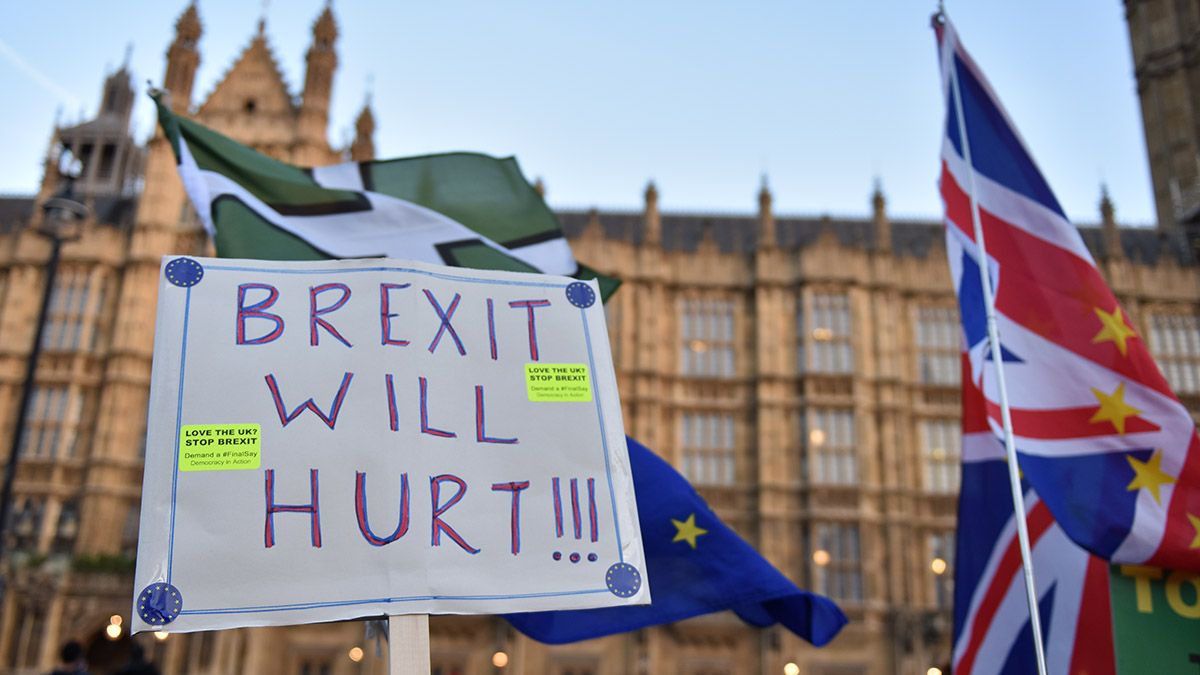The global equities sell-off in October exposed uncertainty in the market, contingent on varying fundamental factors, affecting investor confidence playing out across the indices. The FTSE 100 has lost about 7% year-to-date (YTD), while the NASDAQ, S&P 500 and Dow Jones have also all struggled. It’s certainly not a good time for stocks, but is change afoot?
Brexit uncertainty sends pound plummeting
While Prime Minister Theresa May continues to suffer from Brexit defeats in the House of Commons, the pound has fallen to an 18-month low, trading at £0.79 to the dollar. Traditionally, the UK equity market has been known to rally when the sterling slumped, however with sustained weakness in the pound due to continued negative Brexit rhetoric, bullish momentum for the FTSE 100 has dropped.
The FTSE 100 index suffered its biggest percentage fall on 6 December since the day after the EU referendum in 2016, closing almost 218 points lower at 6,704. The day’s sell-off means the FTSE 100 has fallen as much as 14% from its all-time high in May. However, this wasn’t entirely down to Brexit, with European stocks as a whole becoming increasingly unpopular globally.
Notably, investors are uncomfortable with the uncertainty around the European Central Bank (ECB) winding down its quantitative easing (QE) programme, a huge bond buying exercise. President of the ECB, Mario Draghi, has said the central bank is still on track to halt the quantitative easing scheme in December, despite the euro falling nearly 5% since January.
14%
FTSE 100 fall from its all-time high in May
US economy weighed down by risks
The global stock market jumped as a result of the Federal Reserve saying that interest rate rises would occur at an even more gradual pace, particularly in the US where the Dow rallied 2.5% off the back of the news, its highest percentage gain since March 2018.
Meanwhile, one of Wall Street’s most reliable predictive measures – the yield curve – is signalling slower economic growth for the year ahead. After inverting on 3 December, it has flattened out in recent weeks. This is typically not a good environment for stocks as on average investors receive a 4% gain on stocks versus an average of 19% on gold, one year after these inversions.
The yield curve is created by plotting US government bond yields of different maturities on a single graph, with the Federal Reserve’s overnight interest rate at one end and the 30-year long treasury bond at the other.
US-China trade skirmish holds markets down
While the 90-day trade truce sparked a stock rally on 3 December, it was short lived as investor sentiment quickly shifted. By the next day the Dow, NASDAQ and S&P 500 had all dropped more than 3%. To add to the sense of apprehension, news broke that Meng Wanzhou, the CFO of Huawei, one of China’s biggest companies, had been arrested in Canada.
This has led to panic among investors, who fear it will destabilise already precarious negotiations between the US and China over future trade relationships. Meng faces extradition to the US, reportedly on charges of cyber-espionage and breaking sanctions preventing trade with Iran.
Ultimately, the US-China questions seems to be the most consequential of all the mitigating factors. Jamie Dimon, CEO of JPMorgan Chase, believes as such, saying the trade “skirmish” is forcing business leaders to find new supply lines, rethink investments or hold-off on investments. “Those things are just causing uncertainty, which causes volatility,” Dimon said.
“Those things are just causing uncertainty, which causes volatility” - Jamie Dimon, CEO of JPMorgan Chase
Spotlight
Diageo, FTSE 100
Diageo’s [DGE] share price has increased more than 10% since hitting a second-half low in mid-October. Diageo is also thought to be plotting a move into the cannabis-infused alcohol market. The company appears to be heading in the right direction after selling value brands such as Fireball, holding a forward P/E ratio of 20.86 and a profit margin of 25%.
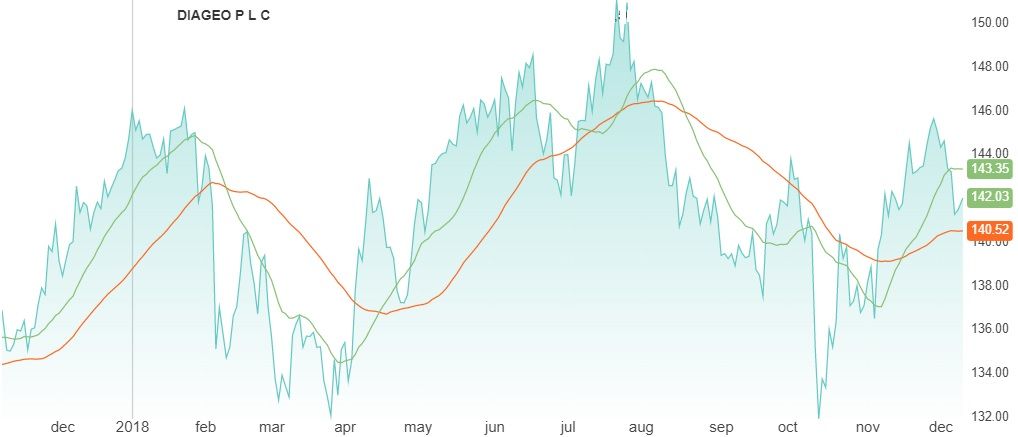
Diageo share price performance, NASDAQ interactive chart, as at 12 December 2018
McDonald's, Dow Jones
Over the last month, McDonald’s [MCD] stock has been on the increase, which has largely been driven by a 4.2% rise in sales in the third quarter as it gains market share in a fiercely competitive industry. The American fast food company’s third-quarter sales growth topped the roughly 3.5% gains of the industry overall. While it’s one of the few stocks to hit an all-time high in an otherwise tough November, overall the stock has risen 7.5% since January, recovering from a mid-year dip. The company is spending heavily to modernise its stores, as it launches new franchises, delivery services, concept stores and enhanced digital ordering capabilities.
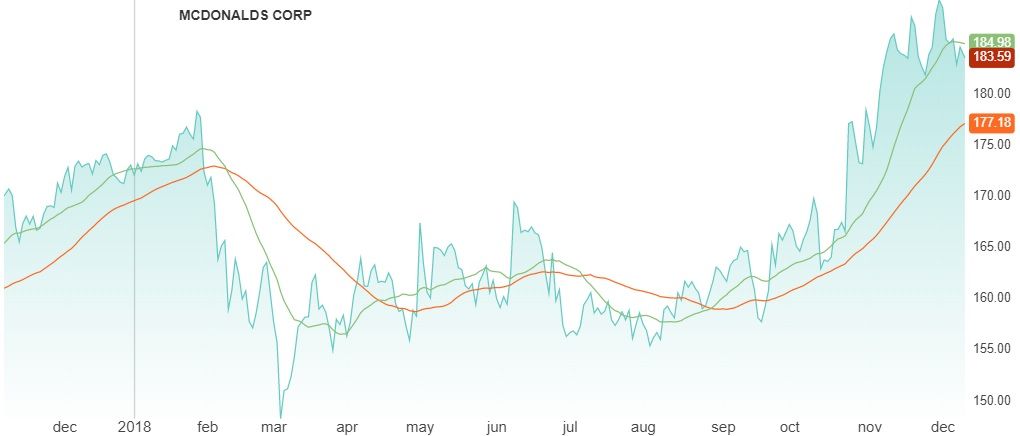
McDonald's share price performance, NASDAQ interactive chart, as at 12 December 2018
Exelon, S&P 500
Exelon [EXC] is trading at all-time highs, up 20% YTD. The energy company currently enjoys a P/E ratio of 12.18 and has had unbridled growth ever since a year low of $35.98 in February.
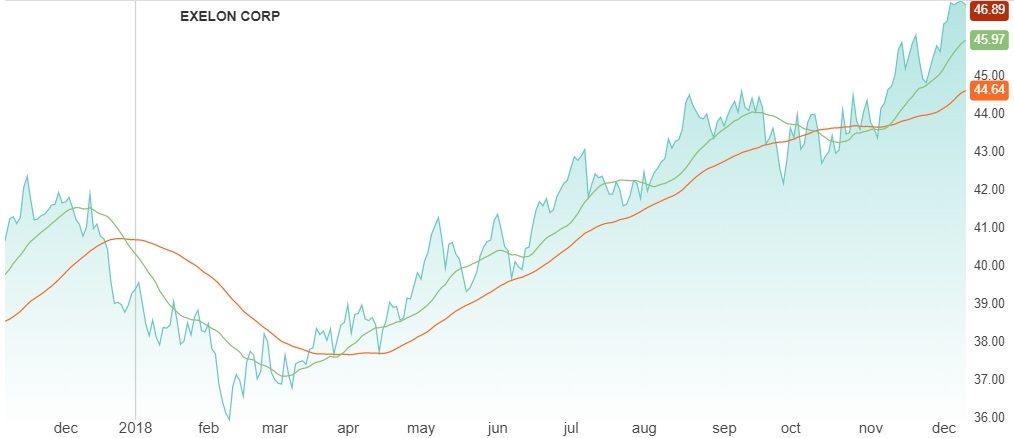
Exelon share price performance, NASDAQ interactive chart, as at 12 December 2018
NASDAQ: Tesla
Tesla’s [TSLA] share price is up 12% since mid-November and 17% YTD, despite an incredibly volatile year. The company’s rating was recently upgraded to ‘buy’ by Jefferies analysts, who pointed to a strengthening balance sheet, growth relative to the auto industry and improved productivity. Tesla shares have risen near 40% this quarter, while the S&P 500 has lost 7%. Tesla shares gained 1.8% in premarket trading on 7 December following the upgrade.
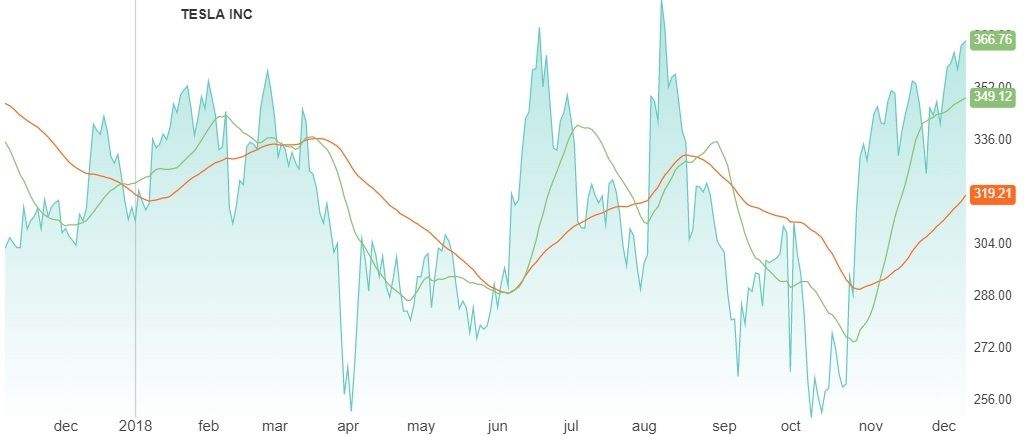
Tesla share price performance, NASDAQ interactive chart, as at 12 December 2018
Indices outlook
What’s next?
The arrest of Huawei’s Meng seems to suggest an escalation of the trade war in a new frontier despite the 90-day truce on tariff increases agreed at the G20 summit. “You have to see this as a significant escalation in the trade war,” Christopher Balding, a China expert at Fulbright University in Vietnam, said.
Meng's arrest “suggests that the gloves are now fully off in this arena,” Balding added. Meanwhile, across the pond the US has been known to indict Chinese personnel on similar charges, however at the time, Obama was reluctant to take more drastic action “over fear that Beijing would retaliate against US interests in China or in other countries,” Eurasia Group analysts wrote in a note.
“You have to see this as a significant escalation in the trade war” - Christopher Balding, China expert at Fulbright University, Vietnam
Morgan Stanley [MS] economists are predicting the global economy to grow by 3.6% in 2019, which is 0.2% lower than 2018’s growth. The International Monetary Fund doesn’t share its outlook, as it expects slowing growth in Asia and Europe to impact the US in the year ahead.
“We have long been predicting somewhat lower [US] growth for 2019 than what we are seeing this year,” Maurice Obstfeld, chief economist at IMF, said. “But the slowdown outside the US, to the extent we are seeing signs of that, seems to be more dramatic.”
Ultimately, a lot of the stock market’s tensions come down to the pressure of trade restrictions, as a lot of global investment and production are encompassed by it.
Continue reading for FREE
- Includes free newsletter updates, unsubscribe anytime. Privacy policy

